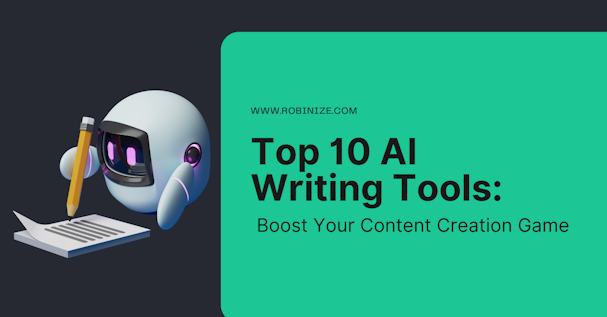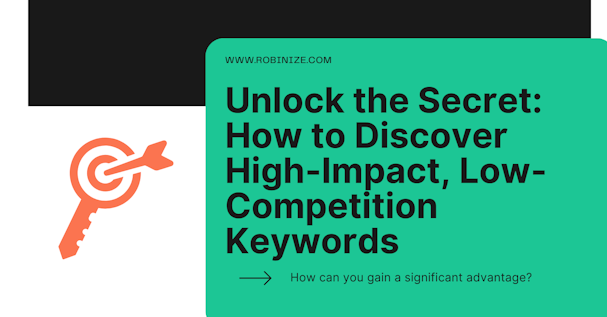How to use AI for SEO content in 2023

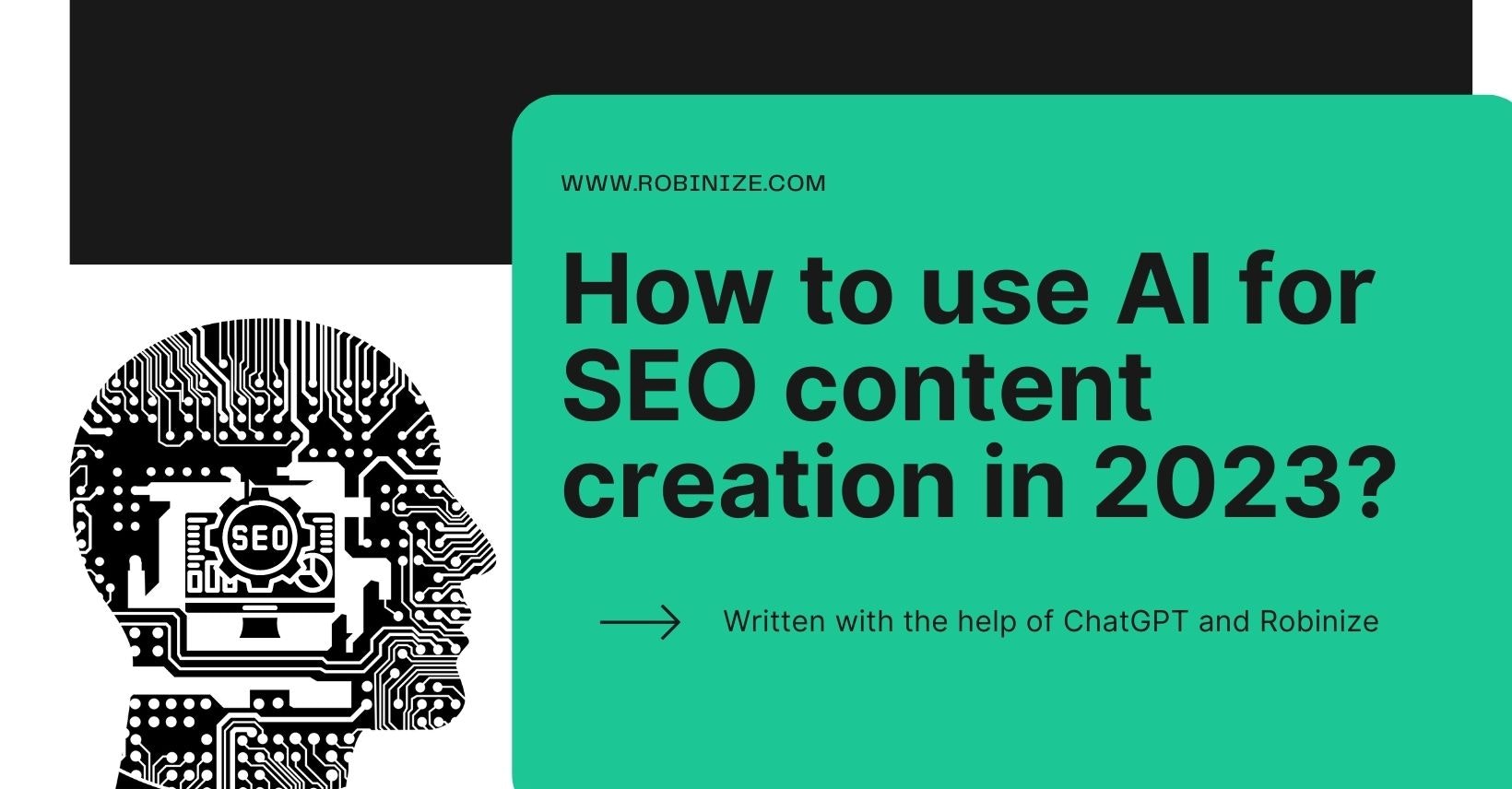
AI is a big thing now, and many different industries use it at the moment, including SEO.
You can use AI to help improve a website's search engine rankings by providing insights into what keywords to use on the site and how to structure the content to make it more search engine friendly.
Additionally, you can use it to analyze a website's performance and provide recommendations for improvement.
However, it's important to note that AI is not a replacement for human expertise, and you should use it s a tool to augment, not replace, the skills and knowledge of SEO professionals.
What is AI?
AI, or artificial intelligence, is the simulation of human intelligence in machines programmed to think and act like humans.
The first use of AI was in computers, which helped create machine learning. These machines are trained to perform tasks typically requiring human cognition, such as problem-solving and decision-making.

AI is a broad field that encompasses a range of technologies and applications:
machine learning,
deep learning,
natural language processing,
Robotics,
computer vision, etc.
It is a rapidly growing technology field transforming many industries, including search engine optimization (SEO) and content creation.
How is AI Used to Create Content?
With the help of AI, content creators can generate high-quality blog posts, articles, and other forms of written content quickly and efficiently, making the SEO process more effective and streamlined.
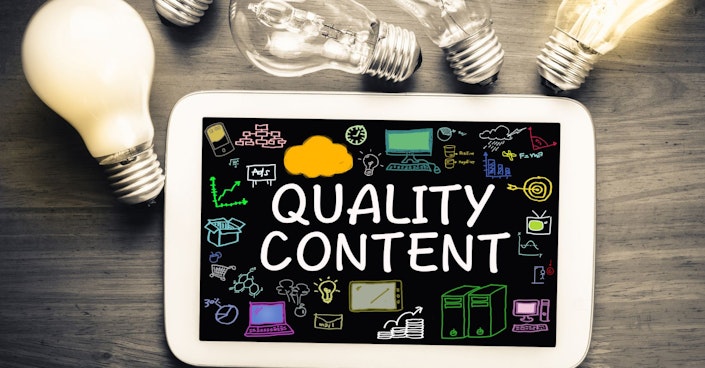
You can use AI to create content in several ways:
One way is through natural language processing (NLP) technology, which allows AI systems to understand and generate human-like text. This can be used to automatically generate news articles, social media posts, or other written content.
Another way AI is used in SEO is through keyword research tools.These tools use machine learning algorithms to analyze large amounts of data, including existing text and search engine queries, to identify the most popular and relevant keywords for a given topic. This allows content creators to target specific keywords in their writing, improving the chances that their content will rank highly in search engine results.
Using machine learning algorithms to create personalized content for individual users based on their interests and preferences.
Using AI to curate and organize existing content, such as selecting the most relevant or interesting pieces of content from a large corpus of data.
Using AI to create visual content based on input data or user preferences, such as images, videos, or graphics.
Using AI to augment or enhance existing content, such as by adding additional context, information, or insights to existing text or media.
Overall, the use of AI in content creation is still a developing field. Much research is being done to improve and expand upon the capabilities of these systems.
How to use AI for SEO?
You can use AI to improve search engine optimization (SEO) in several ways:
One way is through the use of natural language processing (NLP) technology to analyze and understand the content of a website or web page. This can help identify any issues with the content, such as poor keyword usage or a lack of coherence, and suggest ways to improve it.
AI is also being used to develop new SEO tools to help content creators improve their writing. For example, some AI-powered writing tools can help writers craft more engaging and compelling paragraph structures or suggest alternative words and phrases that capture a reader's attention more effectively. These SEO AI tools can save content creators time and effort, allowing them to focus on other aspects of the SEO process.
Another way AI is being used in SEO is through developing AI-powered writing assistants. These assistants can analyze existing text and suggest edits and improvements, helping content creators to craft more effective and SEO-friendly content. For example, some writing assistants can help with paragraph writing for blog posts based on a given topic. This makes it easier for content creators in different ways to write content quickly and efficiently.
Finally, AI can be used for SEO through machine learning algorithms to analyze and understand user behavior. These algorithms can be trained on data about how users interact with search engines and websites and can then be used to predict which types of content are most likely to rank highly in search results. This can help identify opportunities for improving the ranking of a website or web page.
Overall, AI can be a powerful tool for improving SEO. Still, it is essential to use it carefully and in conjunction with other SEO best practices to ensure it is effective.
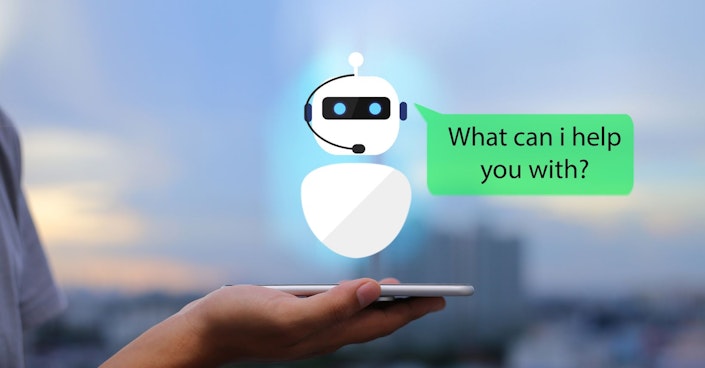
Why is AI SEO Important?
AI is important for search engine optimization (SEO) because it can help businesses and organizations improve their search engine rankings and drive more website traffic.
AI-powered tools can analyze and understand a website's content, user behavior, and the strategies and tactics of competitors and use this information to identify opportunities for improving a website's search engine performance.
Additionally, AI can help businesses and organizations create high-quality, keyword-optimized content more efficiently and effectively. This can improve their search engine rankings and drive more website traffic.
Overall, using AI in SEO can help businesses and organizations improve their online presence and reach more customers, positively impacting their bottom line.
Can Google Detect AI-Generated Content?
Google can detect AI-generated content, but it can be challenging. One way that Google may be able to see AI-generated content is through the Turing test, a measure of a machine's ability to exhibit intelligent behavior that is indistinguishable from a human. If an AI system cannot pass the Turing test, Google will likely be able to identify it as being generated by a machine rather than by a human.
Another way that Google can detect AI-generated content is through natural language processing (NLP) technology, which allows AI systems to understand and generate human-like text. For example, Google can use NLP to analyze the content of a website or web page and identify any patterns or characteristics that are typical of AI-generated text.
While Google can detect AI-generated content, there is no guarantee that it will always be able to do so. Therefore, businesses and organizations need to use AI responsibly and transparently to avoid potential issues with search engine algorithms.
Is AI going to take away jobs from SEO and content creators?
Using AI in search engine optimization (SEO) and content creation could lead to job displacement in those fields. However, as AI systems become more advanced and capable of performing tasks that humans previously did, there is a risk that some jobs may be automated.
However, it is essential to note that AI is expected to replace human workers in these fields partially. While AI systems may perform some tasks more efficiently than humans, they still require human oversight and input to function effectively. Additionally, using AI in SEO and content creation may create new job opportunities, as companies and organizations will still need people to develop and manage these systems.
Overall, the impact of AI on jobs in the SEO and content creation fields is likely to be complex and varied. Therefore, it is crucial for workers in these fields to stay up to date on the latest developments in AI and to adapt to changing conditions to remain competitive.
Can AI-generated content be copyrighted?
In most cases, AI-generated content can be copyrighted. In the United States, copyright law states that "original works of authorship" are eligible for copyright protection, including any creative work produced by a person or machine. The resulting content can be copyrighted as long as the AI system meets the requirements for originality and creativity.
However, it is important to note that the individual or organization that created the AI system may not necessarily own the copyright to the content it generates. Sometimes, the person or entity that commissions the AI system to create the content may be the work's " author " and, therefore the copyright owner. Consequently, it is essential to carefully consider these issues and consult with a lawyer to ensure that copyright ownership is determined correctly.
ChatGPT3 and Robinize: Optimal solution for SEO content creation
GPT-3 (short for "Generative Pretrained Transformer 3") is a large language model developed by OpenAI. It is trained using a technique called unsupervised learning, which involves feeding a model large amounts of text data and allowing it to learn the patterns and structure of the language on its own. Once trained, GPT-3 can generate text similar to human-written text in various styles and formats.
In terms of improving user experience, one could use GPT-3 in various ways. For example, you can use it to generate more natural-sounding responses in chatbots, making the conversation more enjoyable for users. You can also use it to automatically generate high-quality website content, improving the user experience by providing more engaging and relevant information. Additionally, you can use GPT-3 to assist with language translation, making accessing content in different languages more accessible. However, it is essential to note that these are just a few potential applications of GPT-3. Its ability to improve the user experience will ultimately depend on how it is used and integrated into specific technologies or products.
Robinize is an AI-powered SEO content optimization tool for content writers. You need to enter a phrase you want to rank for on Google and you will get exact information about terms and topics you need to cover to drive organic traffic. It is one of the best tools to help you produce high-quality SEO content. In addition, it has a free trial, so you can start outranking your competitors for free.
Combining these two AI tools allows you to create and optimize SEO content faster and get better rankings.
I used these two tools to write the content you are reading right now. AI wrote all the above text you just read; I made minor adjustments.
I first chose the topic and entered it into Robinize. Then, I copied the terms Robinize gave me and picked a few headings suggested in the "Outlines".
Then I wrote into ChatGPT3:
"Write me a 1500-word long blog on AI for SEO content creation.
Use these keywords: keyword research, SEO tools, machine learning, ai SEO, search engines, blog posts, Turing test, content creators, paragraph writing, SEO ai tools, existing text, above text, and writing tools.
Use these headings: What is AI? How is AI Used to Create Content? How to use AI for SEO? Can Google Detect AI-Generated Content?"
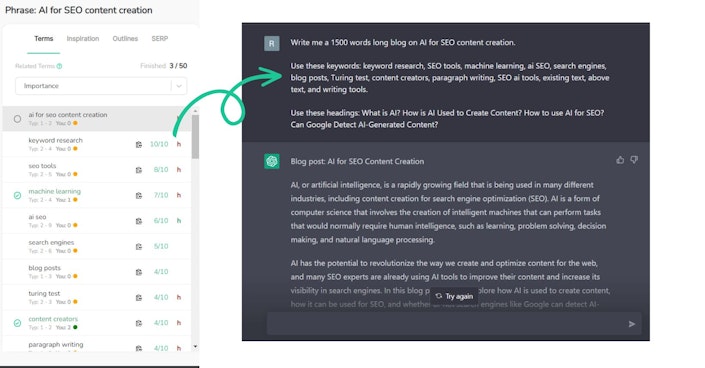
After I got the answer, I pasted it into Robinize and asked ChatGPT3 additional questions to include more information.
The best way is to use ChatGPT3 to answer questions and then use the write feature in Robinize to rephrase the blog's first draft. I used Terms, Inspiration, Outlines, and SERP analysis to get a good ranking. With all of that, this should be a relevant blog that will meet user intent.
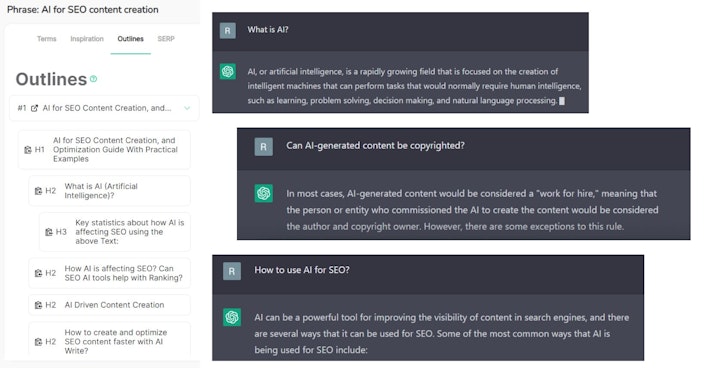
If you came here organically, you know that ChatGPT3 and Robinize are the optimal solutions for your SEO and content marketing strategies.
Wrapping up
In conclusion, AI is a powerful tool transforming the world of SEO and content creation. Content creators can quickly and efficiently generate high-quality, SEO-friendly content using AI-powered keyword research tools, writing assistants, and other tools. While search engines like Google can detect AI-generated content, responsible and ethical use of AI tools can help content creators avoid potential issues. So, do not be afraid of AI content creation.
Are you ready to try writing your blog or article using Robinize and ChatGPT3?
I'm sure you want to avoid the tedious work of writing quality content for your website so you can focus on your work. Try these two tools and make your life easier and, at the same time, improve your search engine ranking.
